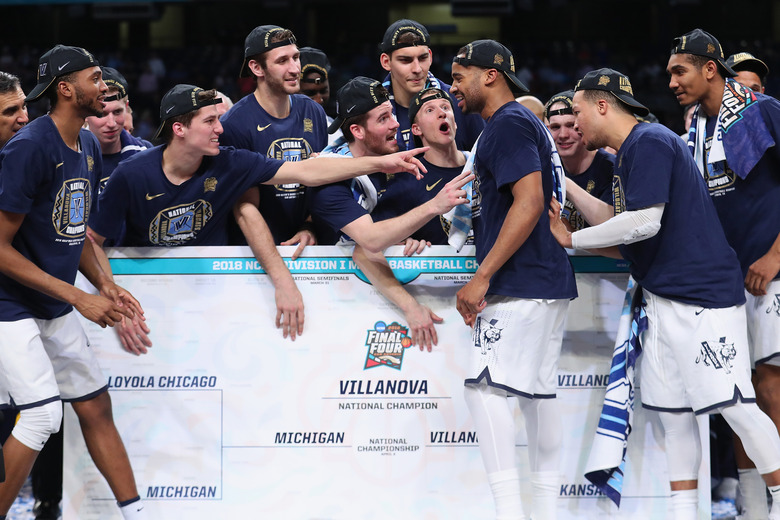This Is Why It's So Tough To Get A Perfect March Madness Bracket
Picking the perfect March Madness bracket is the pipe dream for everyone who puts pen to paper in an attempt to predict what's going to happen in the tournament.
But we would bet good money that you've never even met anybody who's achieved it. In fact, your own picks probably fall way short of the sort of accuracy you'd hope for when first putting your bracket together. So why is it so difficult to predict the bracket perfectly?
Well, all it takes is one look at the mind-bogglingly big number that comes out when you look at the probability of a perfect prediction to understand.
_**ICYMI:** Check out Sciencing's guide to 2019 March Madness, complete with statistics to help you fill out a winning bracket._
How Likely is Picking the Perfect Bracket? The Basics
How Likely is Picking the Perfect Bracket? The
Basics
Let's forget about all of the complexities that muddy the waters when it comes to predicting the winner of a basketball game for now. To complete the basic calculation, all you need to do is assume you have a one in two (i.e. 1/2) chance of picking the right team as the winner of any game.
Working from the final 64 competing teams, there are a total of 63 games in March Madness.
So how do you work out the probability of predicting more than one game right? Since each game is an independent outcome (i.e. the result of one first-round game has no bearing on the result of any of the others, in the same way the side that comes up when you flip one coin has no bearing on the side that will come up if you flip another), you use the product rule for independent probabilities.
This tells us that the combined odds for multiple independent outcomes is simply the product of the individual probabilities.
In symbols, with P for probability and subscripts for each individual outcome:
\(P = P_1 × P_2 × P_3 × ...P_n\)
You can use this for any situation with independent outcomes. So for two games with an even chance of each team winning, the probability P of picking a winner in both is:
\(\begin{aligned}
P &= P_1 × P_2\)
\(&= {1 \above{1pt}2} × {1 \above{1pt}2}\)
\(&= {1 \above{1pt}4}
\end{aligned}\)
Add a third game and it becomes:
\(\begin{aligned}
P &= P_1 × P_2 × P_3\)
\(&= {1 \above{1pt}2} × {1 \above{1pt}2}× {1 \above{1pt}2}\)
\(&= {1 \above{1pt}8}
\end{aligned}\)
As you can see, the chance reduces really quickly as you add games. In fact, for multiple picks where each one has an equal probability, you can use the simpler formula
\(P={P_1}^n\)
Where n is the number of games. So now we can work out the odds of predicting all 63 March Madness games on this basis, with n = 63:
\(\begin{aligned}
P&={\bigg(\frac{1}{2}\bigg)}^{63} \
&= \frac{1}{9,223,372,036,854,775,808}
\end{aligned}\)
In words, the odds of it happening are about 9.2 quintillion to one, equivalent to 9.2 billions of billions. This number is so huge that it's quite difficult to imagine: For example, it's over 400,000 times as big as the U.S. national debt. If you travelled that many kilometers, you'd be able to travel from the Sun right out to Neptune and back, over a billion times. You'd be more likely to hit four holes in one in a single round of golf, or be dealt three royal flushes in a row in a game of poker.
Picking the Perfect Bracket: Getting More Complicated
Picking the Perfect Bracket: Getting More
Complicated
However, the previous estimate treats every game like a coin flip, but most games in March Madness won't be like that. For example, there is a 99/100 chance that a No. 1 team will advance through the first round, and there is a 22/25 chance that a top three seed will win the tournament.
Professor Jay Bergen at DePaul put together a better estimate based on factors like this, and found that picking a perfect bracket is actually a 1 in 128 billion chance. This is still hugely unlikely, but it cuts the previous estimate down substantially.
How Many Brackets Would it Take to Get One Perfectly Right?
How Many Brackets Would it Take to Get One
Perfectly Right?
With this updated estimate, we can start to look at how long it would be expected to take before you got a perfect bracket. For any probability P, the number of attempts n it will take on average to achieve the outcome you're looking for is given by:
\(n=\frac{1}{P}\)
So for getting a six on a roll of a die, P = 1/6, and so:
\(n=\frac{1}{1/6}=6\)
This means it would take six rolls on average before you rolled a six. For the 1/128,000,000,000 chance of getting a perfect bracket, it would take:
\(\begin{aligned}
n&=\frac{1}{1/128,000,000,000} \&=128,000,000,000
\end{aligned}\)
A huge 128 billion brackets. This means that if everybody in the U.S. filled out a bracket each year, it would take about 390 years before we'd expect to see one perfect bracket.
That shouldn't discourage you from trying, of course, but now you have the perfect excuse when it doesn't all work out right.
_Feeling the March Madness spirit? Check out our tips and tricks for filling out a bracket, and read why it's so hard to predict upsets._
Cite This Article
MLA
Johnson, Lee. "This Is Why It's So Tough To Get A Perfect March Madness Bracket" sciencing.com, https://www.sciencing.com/this-is-why-its-so-tough-to-get-a-perfect-march-madness-bracket-13717392/. 1 March 2019.
APA
Johnson, Lee. (2019, March 1). This Is Why It's So Tough To Get A Perfect March Madness Bracket. sciencing.com. Retrieved from https://www.sciencing.com/this-is-why-its-so-tough-to-get-a-perfect-march-madness-bracket-13717392/
Chicago
Johnson, Lee. This Is Why It's So Tough To Get A Perfect March Madness Bracket last modified March 24, 2022. https://www.sciencing.com/this-is-why-its-so-tough-to-get-a-perfect-march-madness-bracket-13717392/
